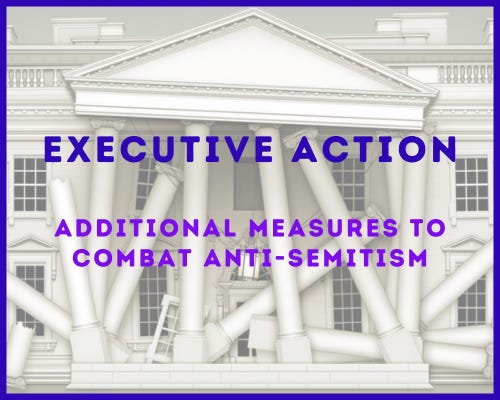Overview:
This executive order expands upon previous federal efforts to combat anti-Semitism, particularly in response to rising incidents following the October 7, 2023, Hamas attacks against Israel. It mandates federal agencies to enhance enforcement of civil rights protections, monitor anti-Semitic activities in educational institutions, and increase collaboration among government departments. While framed as a necessary step to address discrimination and violence against Jewish communities, the order raises concerns about potential overreach, the impact on free speech, and the implications for academic freedom.
Detailed Analysis:
Agency Reporting and Enforcement Enhancements:
Policy: Requires all executive departments and agencies to submit reports within 60 days identifying legal authorities they can use to combat anti-Semitism and detailing actions taken since October 7, 2023.
Progressive Concern:
Strengthening civil rights enforcement is crucial, but the order’s broad directive may lead to inconsistent application across agencies without clear guidelines.
If enforcement is politicized, it could disproportionately focus on certain forms of anti-Semitism while neglecting other hate crimes and civil rights violations.
Department of Justice (DOJ) Oversight and Legal Actions:
Policy: Directs the DOJ to provide an inventory and analysis of cases involving anti-Semitism, particularly at institutions of higher education, and to use legal measures to hold violators accountable.
Progressive Concern:
Expanding DOJ oversight could deter universities from allowing open discussion on contentious issues, especially regarding Israel and Palestine.
The order must ensure that legitimate criticism of government policies is not conflated with anti-Semitism, preserving academic freedom and First Amendment rights.
Department of Education (DOE) Civil Rights Investigations:
Policy: Requires the DOE to review all Title VI complaints related to anti-Semitism and assess whether educational institutions are addressing these issues adequately.
Progressive Concern:
While protecting students from discrimination is essential, there is a risk that universities could face pressure to censor discussions that are critical of Israel.
Civil rights investigations should be applied equitably to ensure all forms of discrimination—including Islamophobia and other racial or religious biases—are addressed with the same urgency.
Monitoring and Reporting on International Students and Staff:
Policy: Instructs federal agencies to provide recommendations for monitoring and reporting activities of international students and staff at universities to determine if they meet inadmissibility criteria under U.S. immigration law (8 U.S.C. § 1182(a)(3)).
Progressive Concern:
Targeting international students and staff raises concerns about racial profiling, discrimination, and the erosion of privacy rights.
Universities should not be turned into surveillance grounds that disproportionately impact students based on nationality or perceived political beliefs.
The order could create a chilling effect, discouraging international scholars from engaging in political discourse or studying in the U.S.
Historical Context:
Executive Order 13899 (2019) expanded Title VI protections to include anti-Semitic discrimination in federally funded institutions, setting a precedent for federal intervention in university policies.
Previous debates over anti-Semitism legislation have included concerns about balancing civil rights protections with free speech rights, particularly in academic settings.
There has been an ongoing discussion on defining anti-Semitism in relation to criticism of Israel, with organizations like the International Holocaust Remembrance Alliance (IHRA) advocating for broad definitions that some argue could stifle political discourse.
Broader Implications:
Impact on Free Speech: Universities and students could face pressure to self-censor, fearing legal repercussions for discussions related to Middle East policies.
International Student Rights: Increased surveillance and reporting measures could create an unwelcoming environment for foreign scholars, harming academic exchange programs.
Civil Rights Enforcement Consistency: If anti-Semitism enforcement is strengthened, similar measures should be taken to address Islamophobia, racism, and other forms of discrimination.
Social Media Posts:
Post 1: Fighting anti-Semitism is critical, but we must ensure civil rights enforcement doesn’t infringe on free speech or lead to unfair targeting of international students. Read more: https://www.whitehouse.gov/presidential-actions/2025/01/additional-measures-to-combat-anti-semitism/ #FreeSpeech #AcademicFreedom #ProtectCivilRights
Post 2: We must stand against all hate, including anti-Semitism. But cracking down on campus discussions or increasing surveillance of students isn’t the answer. #HumanRightsForAll #ProtectFreeSpeech #NoToProfiling
Post 3: Anti-Semitism must be confronted, but so must Islamophobia and all forms of hate. Civil rights enforcement should be consistent and fair for everyone. #EqualProtection #StopHate #JusticeForAll



